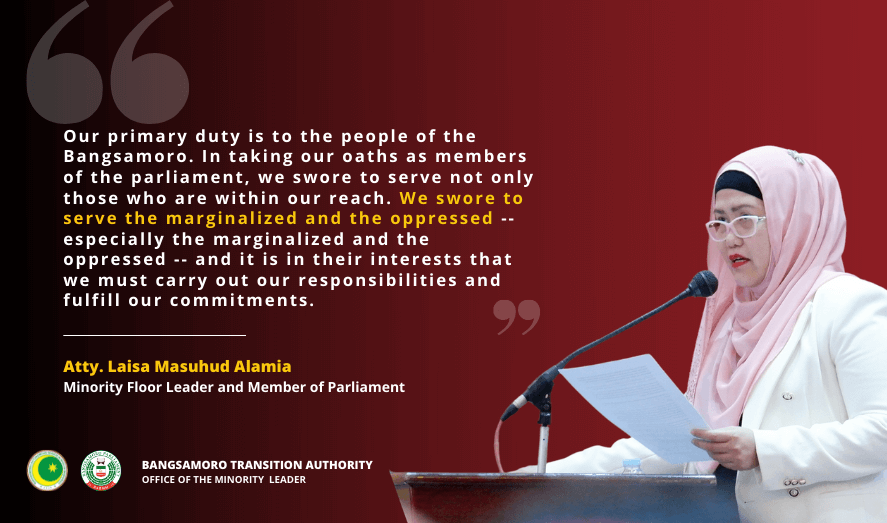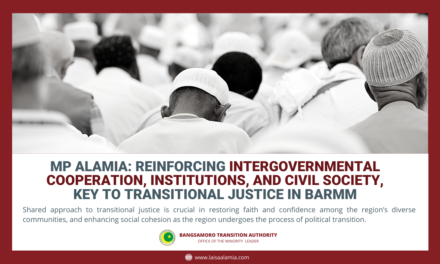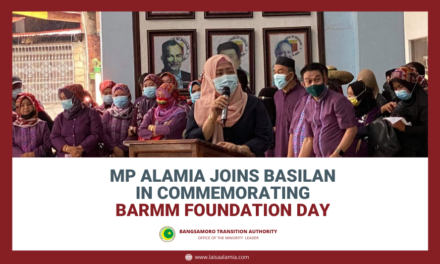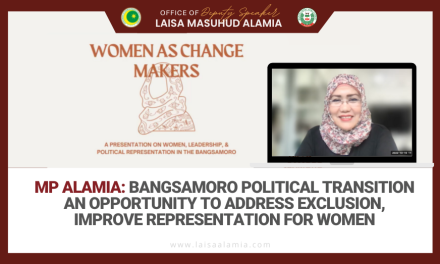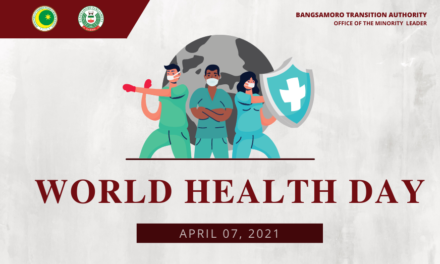BY: MP Atty. Laisa Masuhud Alamia, RN, CESE
Assalamu’alaikum warahmatullahi wabarakatuhu.
I rise on a personal and collective privilege to speak on the matter of the proverbial black swan, otherwise known as the extension of the BTA.
When we took our seats within the august halls of the Bangsamoro Parliament, we did so with a commitment to serve the people of the Bangsamoro. While we are thankful for the nomination by the GPH and the MILF peace panels and appointment by the president, our mandate is only truly made possible by the collective struggle of our people, the Bangsamoro, as they fought not only for genuine autonomy but for the recognition of our social, cultural, economic, civil, and political rights — of human rights for all.
Our primary duty is to the people of the Bangsamoro. In taking our oaths as members of the parliament, we swore to serve not only those who are within our reach. We swore to serve the marginalized and the oppressed — especially the marginalized and the oppressed — and it is in their interests that we must carry out our responsibilities and fulfill our commitments.
Nandito tayo dahil sa Bangsamoro. Nandito tayo para sa Bangsamoro.
This sworn duty is our shared duty — something that we must accomplish together. We took our oaths to serve not as members of the majority only or the minority alone, but as members of one parliament, under one Bangsamoro regional government.
This is why, Mister Speaker, it is a disservice to the people of the Bangsamoro to take the collective struggle for self-determination that we waged in the vast fields and seas of the region, and reduce it into mere politicking within the halls of this parliament.
We began our term knowing full well that despite our best efforts, the limited time we had was bound to be our biggest obstacle, having only been granted three years to facilitate multi-layered and multi-faceted political transition – and this one requires knowledge of government bureaucracy with the competence govern and an experiential understanding of the people’s struggles in the grassroots. This is precisely the reason for the parliament’s current composition, as diversity and inclusion were the standards that were used in establishing an interim government tasked to facilitate a multi-faceted, multi-layered political transition.
Our chief minister acknowledges just as much. In his address to the Bangsamoro yesterday, he emphasized the diversity of the people in the Bangsamoro, all of whom are “united by the common aspiration to address the historical injustices, put an end to various forms of violence, and bring genuine peace and development through our right to self-determination.” All this, he said, “cannot be done overnight.” However, we lay down the foundation that will allow future generations to have better lives in a Bangsamoro region we can all be proud of.
These basic principles of diversity that serves as the backbone of the Bangsamoro parliament and, by extension, the regional government, unfortunately, seem to have been forgotten as we neared the end of the transition period — one that we seek to extend, especially as the pandemic threw the proverbial wrench into the gears of the regional government. Amendments to the Bangsamoro Organic Law that were submitted via a report by the Senate Committee on Local Government do away with the spirit of representation in the Bangsamoro, as it attempts to reallocate the 80 seats of parliament and increase the number of representation nominated by the Moro Islamic Liberation Front (MILF) from 41 to 47 — meaning six seats that are currently held by other sectors will be displaced.
Sultan Kudarat, a province outside the jurisdiction of the Bangsamoro region, is set to gain a seat in the parliament, while Lamitan City — a city that voted in favor of the BOL overwhelmingly during the plebiscite — is denied representation. Other component cities such as Marawi City and Cotabato City are assured of one seat each according to the Senate committee’s proposed amendments. Seats for Christian settlers, non-Moro and other Moro indigenous peoples, the MNLF, Ulama, women, the youth, and other sectors required under the BOL have inadvertently or advertently not been included.
If time is truly of the essence, amendments to the BOL that go beyond the simple act of extending the transition period to 2025 is misleading and, perhaps, even disingenuous. The pressing matter at hand is that the regional government needs more time for a transition, I cannot overemphasize that, hence the appeal for an extension. Going beyond this ask and, in the process, railroading amendments absent of due diligence we afforded the BOL and the information campaign leading up to the plebiscite, is a disservice to the people of the Bangsamoro.
If the extension of the transition period is not about power, as the chief minister himself said yesterday, then why are we taking representation away from our constituency? If the extension is truly about ensuring the successful implementation of the Bangsamoro peace process, then why are we doing away with the conscious effort to democratize the process that gave us the BOL, as we aim for amendments that have nothing to do with the very simple task of extending the transition period?
The Chief Minister is right in saying that the Bangsamoro is not just the legacy of the MILF or of the Duterte Administration, because it is the legacy of every generation that struggled for our right to self-determination. In honor of this inheritance, we commit to the continuous assertion of this hard-won right. In the spirit of self-determination, the people of the Bangsamoro also strongly assert their right to genuine representation. They must not and will not be denied.
Throughout the transition despite the unforeseen challenges, we worked — and are still working, all of us here in the parliament– together to deliver urgent and relevant services in response to an unprecedented public health crisis, as we continue to perform the functions and fulfill the priorities of the parliament, as enumerated in the Bangsamoro Organic Law. Unless our mandate and representation have changed, then there is no reason for us to fall into the trap of divisive politics that was implied in recent Senate proceedings concerning the extension of the transition period for the Bangsamoro regional government.
Mr. Speaker, as everyone was able to witness. When Sen. Panfilo Lacson asked about the reason why we, in the BTA, — in the senator’s own words — “failed to accomplish” the task of passing an electoral code and establishing parliamentary districts in anticipation of the regional elections, Sen. Miguel Zubiri, in response, brought up how “when you talk to one group, they will blame the other group kasi dalawang group ‘yan, e; Majority, minority. You talk to the majority, sabi nila yung Minority daw nanggugulo. ‘Di natatapos (and he’s referring to the electoral code). ‘Pag tinanong mo naman ang Minority, Minoriy kami e.”
Mr. Speaker, ako po ay naaawa doon sa kung sino man ang nagsabi kay Kagalang-galang na Senator Zubiri. Nakakaawa po siya. Ako po ay naniniwala na dito sa loob ng parliament, ay walang nagtangkang magbigay ng ganung klaseng kasinungalingan sa ating mga Senador. Alam po nating lahat dito sa Parliament na ang electoral code at parliamentary districts bill ay hindi pa naisasalang hanggang ngayon. Papaano pa kaya manggugulo ang Minority kung ang electoral code ay wala pa dito sa parliament. Ang Minority po ay hindi manggugulo at never na nanggulo sa pagpasa ng priority codes sapagkat iisa lamang ang ating layunin, ang maitaguyod ang tunay na otonomiya sa Bangsamoro. Kung maalala po natin yung mga priority codes na naipasa na, kagaya ng education code. Ang aming kasama sa Minoriy na si MP Rasol Mitmug mismo ang tumulong kay Minister Iqbal sa pagdepensa sa education code. Ang aming pagtulong sa pagpasa ng iba pang priority codes, kagaya ng civil service code at ng Bangsamoro Administrative code ay alam ng lahat na nandito sa loob ng parliament. Lahat tayo tumulong para maipasa po ‘yon.
Munting paalala lamang sa ating lahat na naririto ngayon, just in case nakalimutan na natin. Hindi po tayo dalawang grupo. Mga Bangsamoro po tayo na iisa lamang ang ating adikhain. Ang BARMM po ay bunga ng dugo at pawis ng ating mga Mujahideen at Mujahidath. We are all Bangsamoro. All of us suffered and endured the injustices committed against the Bangsamoro. Lahat tayo ay dumanas ng pait at sakit bunga ng pakikipaglaban para sa ating mga karapatan bilang mga Bangsamoro. Tayo dito sa BTA, bawat isa sa atin ay appointed by none other than the president himself. We are all jointly and solidarily responsible and mandated to do what is required of us under the BOL. We are members of one parliament, under one regional government. We pushed for a parliamentary form of government to facilitate ease in correspondence and coordination between the executive and legislative arms of the Bangsamoro regional government.
Every parliament that exists in the world right now thrives because of the unique dynamics that exist between the majority and minority blocs, as the minority offers constructive critiques of the policies and programs of the majority in an expression of its commitment and support towards building a strong and vibrant democracy.
Here in the Bangsamoro, we in the minority bloc are here to stand in solidarity with the majority, pitching in at every possible opportunity so that we can uphold transparency and moral governance at every level of the regional government. Members of the minority are not mere contrarians who seek to delay every success that we yearn to achieve together. Why Mr. Speaker? Because for every failure of the BTA — of the BARMM — is also ours to bear and endure together. The failure of the Majority is also the failure of the Minority. Ang failure ng BTA ay failure nating lahat, failure of each one of us. And We, in the Minority, refuse to point our fingers and assign blame to our fellow members of the Bangsamoro parliament as if we could effectively perform our functions without one another. We need each other.
We are all here for one reason, and that is to represent and serve the people of the Bangsamoro. What was once an elephant in the room that we sought to address last year — the false and perceived dichotomy of ARMM versus BARMM — has reared its ugly head as we have come face to face with the perceived, proverbial “black swan” — the Bangsamoro’s need for an extension of the transition period.
But this was not unexpected, for this is precisely the scenario we have been working hard to avoid, knowing that three years is barely enough for established systems to work, let alone for a transitional one such as ours, a new form of government. As we await the decision concerning the extension of the transition period, we will continue the work we have started and pursued with the rest of the Bangsamoro parliament.
We reiterate our support to the leadership of the Bangsamoro Government led by the chief minister, and we reiterate our commitment to serve alongside our fellow members of parliament. Let it be clear that the success of our political transition is only possible with a united Bangsamoro government where we work together not in competition with each other, but in cooperation with one another. Only then can we secure the success of the transition, along with just and lasting peace in our region.
Lastly, Mr. Speaker, since I have worked with everyone, in the Bangsamoro Transition Authority, under the Chief Minister, I would like to say that it has always been an honor serving with all of you. Maraming salamat po.

